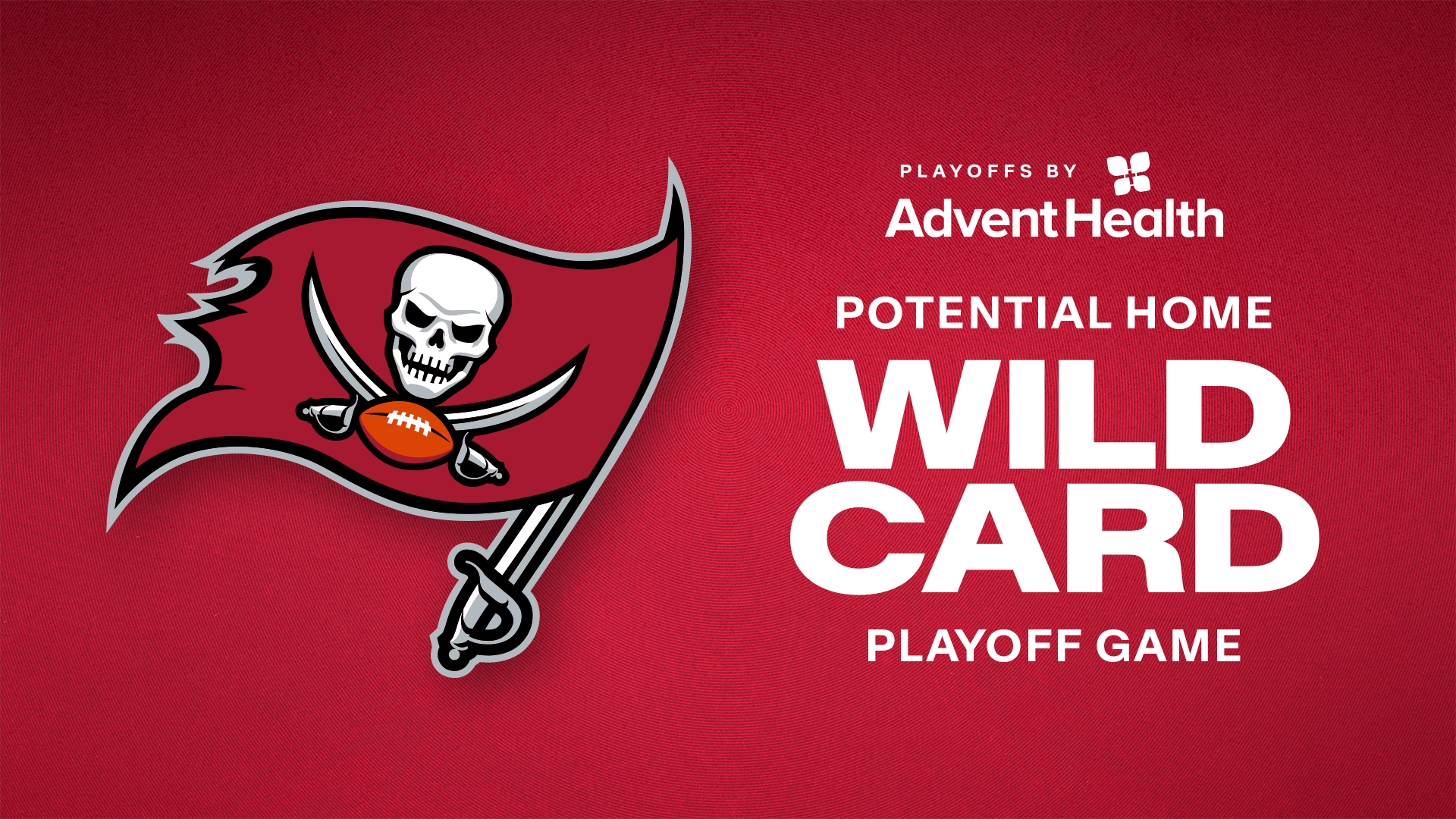Almost exactly a year ago, I wrote in a Mailbag intro about franchise tags and what they meant for teams and players beyond just the current season. At the time, the Tampa Bay Buccaneers were just a few days away from having to make a final decision on using their tag, which they eventually did on the NFL's reigning sack leader, outside linebacker Shaquil Barrett. Barrett ended up signing his one-year tag offer for the 2020 season and was a top performer on the Bucs' Super Bowl-winning squad.
The topic seems relevant again after the Buccaneers exercised their 2021 franchise tag option on wide receiver Chris Godwin on Tuesday. It's the first time the team has ever used a franchise tag in two consecutive seasons. The tag on Barrett ultimately did not lead to a long-term contract, at least not yet, and both sides agreed the uncertainty of the situation caused by the pandemic was a factor in the lack of a deal. Now it's Godwin's turn and it seems obvious that the Buccaneers would like this year's tag to lead to a longer commitment.
Is that likely? We'll let's update the numbers I shared last year, which at the time included 34 tagged players from the previous five seasons (2015-19). The 2020 season gives that total a significant bump as a whopping 14 teams utilized the tag last year. So that's 48 tagged players from 2015-20, and here is what happened with them over the course of each one's ensuing season:
View the top pictures of the Buccaneers wide receivers from the 2020-2021 Season, the NFL Playoffs and Super Bowl LV.
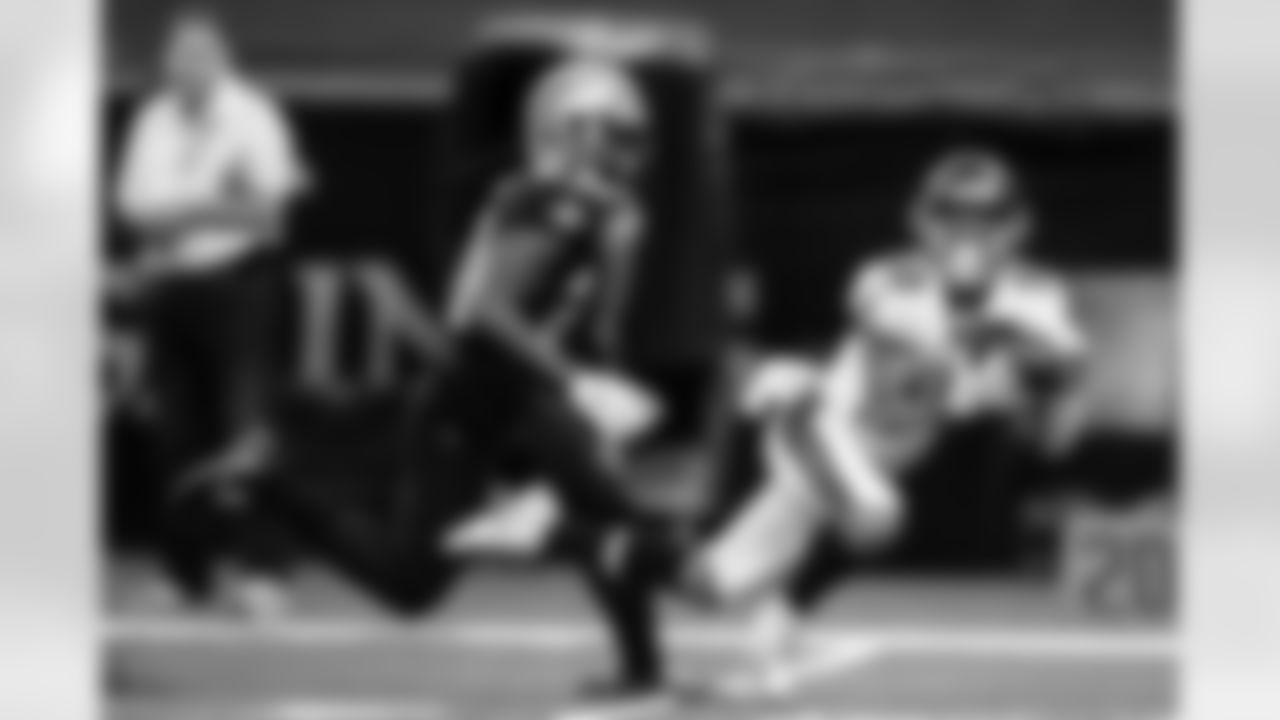
NEW ORLEANS, LA - SEPTEMBER 13, 2020 - Wide Receiver Scotty Miller #10 of the Tampa Bay Buccaneers during the game between the Tampa Bay Buccaneers and New Orleans Saints at Mercedes Benz Superdome. The Buccaneers lost the game, 34-23. Photo By Kyle Zedaker/Tampa Bay Buccaneers
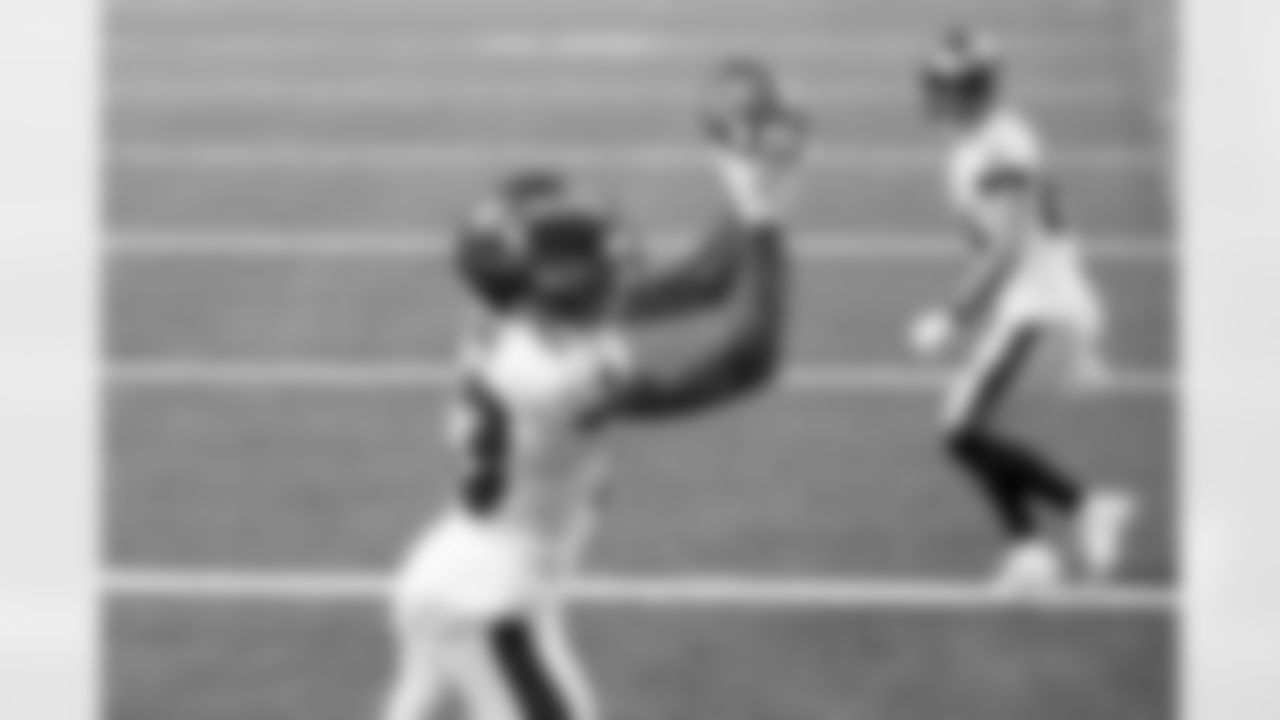
NEW ORLEANS, LA - SEPTEMBER 13, 2020 - Wide Receiver Mike Evans #13 of the Tampa Bay Buccaneers catches a touchdown before the game between the Tampa Bay Buccaneers and New Orleans Saints at Mercedes Benz Superdome. The Buccaneers lost the game, 34-23. Photo By Matt May/Tampa Bay Buccaneers

TAMPA, FL - SEPTEMBER 20, 2020 - Wide Receiver Justin Watson #17 of the Tampa Bay Buccaneers during the game between the Carolina Panthers and Tampa Bay Buccaneers at Raymond James Stadium. The Buccaneers won the game, 31-17. Photo By Matt May/Tampa Bay Buccaneers

DENVER, CO - SEPTEMBER 27, 2020 - Wide Receiver Jaydon Mickens #85 of the Tampa Bay Buccaneers before the game between the Tampa Bay Buccaneers and Denver Broncos at Empower Field at Mile High. The Buccaneers won the game, 28-10. Photo By Kyle Zedaker/Tampa Bay Buccaneers

DENVER, CO - SEPTEMBER 27, 2020 - Wide Receiver Chris Godwin #14 of the Tampa Bay Buccaneers dives for a touchdown during the game between the Tampa Bay Buccaneers and Denver Broncos at Empower Field at Mile High. The Buccaneers won the game, 28-10. Photo By Kyle Zedaker/Tampa Bay Buccaneers

DENVER, CO - SEPTEMBER 27, 2020 - Wide Receiver Chris Godwin #14 of the Tampa Bay Buccaneers celebrates a touchdown during the game between the Tampa Bay Buccaneers and Denver Broncos at Empower Field at Mile High. The Buccaneers won the game, 28-10. Photo By Kyle Zedaker/Tampa Bay Buccaneers

DENVER, CO - SEPTEMBER 27, 2020 - Quarterback Tom Brady #12 and Wide Receiver Mike Evans #13 of the Tampa Bay Buccaneers celebrate a touchdown during the game between the Tampa Bay Buccaneers and Denver Broncos at Empower Field at Mile High. The Buccaneers won the game, 28-10. Photo By Kyle Zedaker/Tampa Bay Buccaneers

TAMPA, FL - OCTOBER 04, 2020 - Wide Receiver Scotty Miller #10 and Quarterback Tom Brady #12 of the Tampa Bay Buccaneers after the game between the Los Angeles Chargers and Tampa Bay Buccaneers at Raymond James Stadium. The Buccaneers won the game, 38-31. Photo By Kyle Zedaker/Tampa Bay Buccaneers
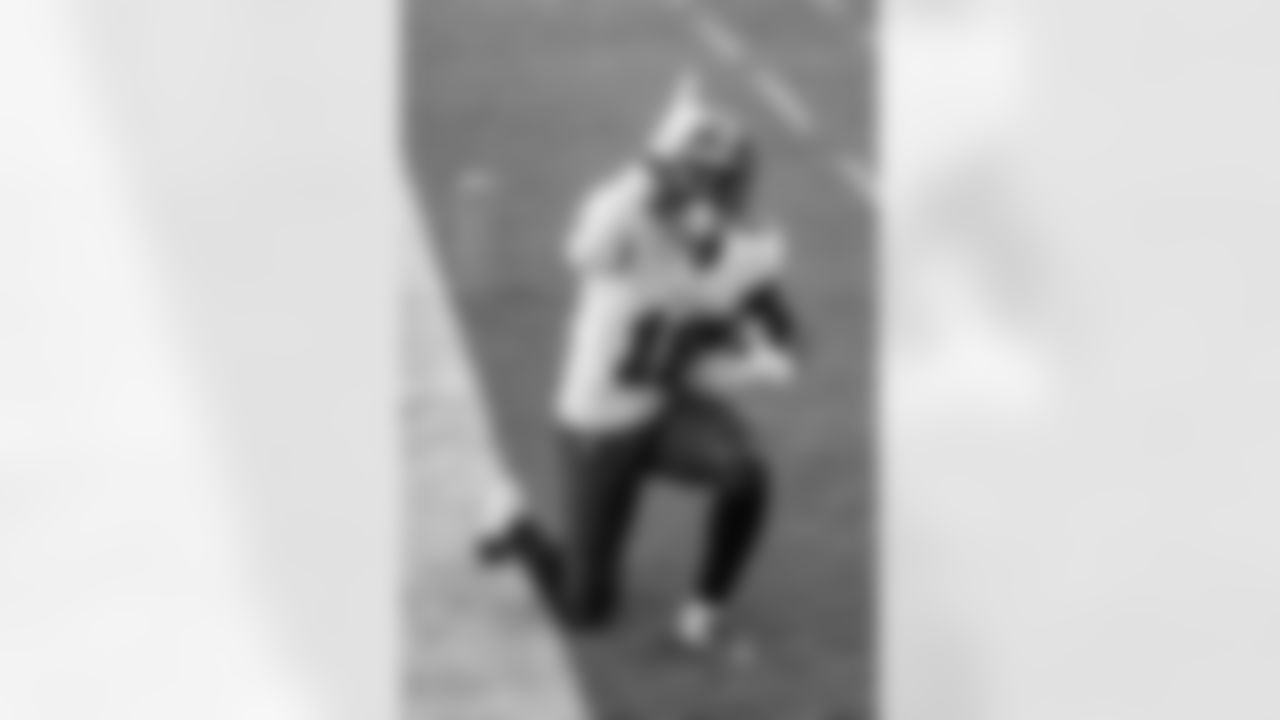
TAMPA, FL - OCTOBER 18, 2020 - Wide Receiver Tyler Johnson #18 of the Tampa Bay Buccaneers celebrates a touchdown during the game between the Green Bay Packers and Tampa Bay Buccaneers at Raymond James Stadium. The Buccaneers won the game, 38-10. Photo By Jason Parkhurst/Tampa Bay Buccaneers

TAMPA, FL - OCTOBER 18, 2020 - Wide Receiver Chris Godwin #14 and Wide Receiver Mike Evans #13 of the Tampa Bay Buccaneers before the game between the Green Bay Packers and Tampa Bay Buccaneers at Raymond James Stadium. The Buccaneers won the game, 38-10. Photo By Kyle Zedaker/Tampa Bay Buccaneers

TAMPA, FL - OCTOBER 25, 2020 - Wide Receiver Justin Watson #17 and Wide Receiver Scotty Miller #10 of the Tampa Bay Buccaneers celebrate a touchdown during the game between the Tampa Bay Buccaneers and Las Vegas Raiders at Allegiant Stadium. The Buccaneers won the game 45-20. Photo By Kyle Zedaker/Tampa Bay Buccaneers
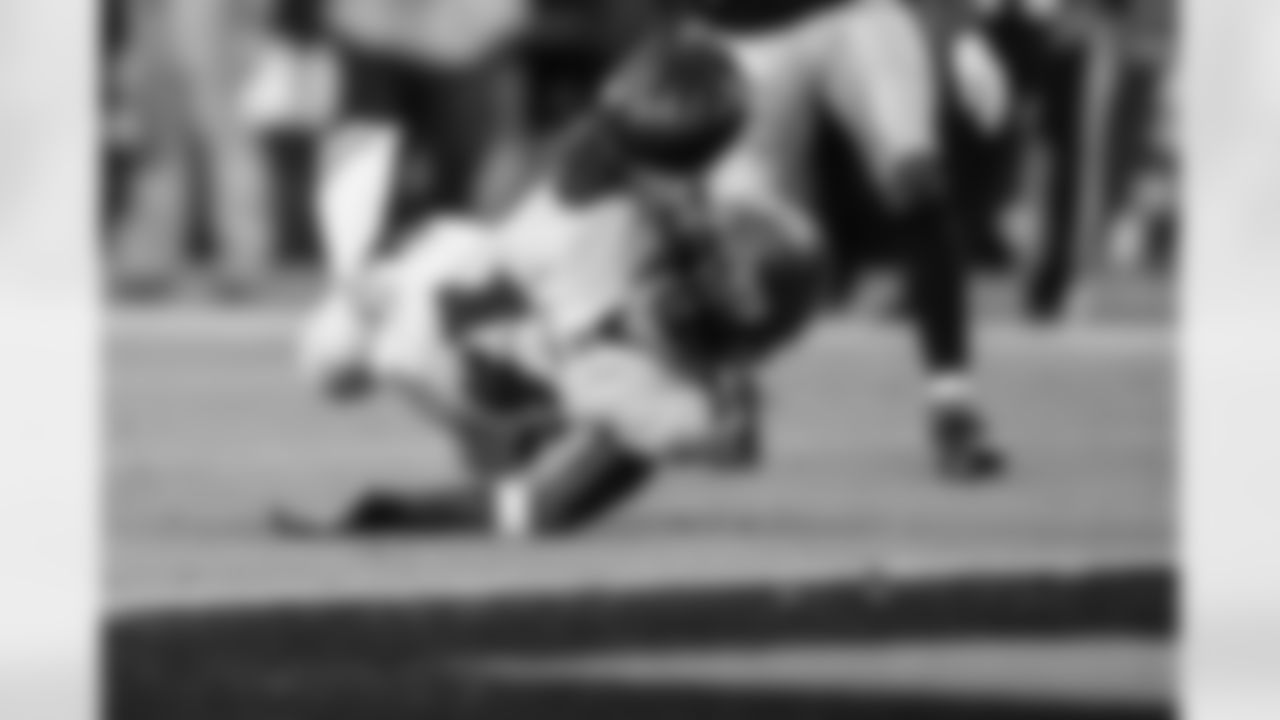
TAMPA, FL - OCTOBER 25, 2020 - Wide Receiver Chris Godwin #14 of the Tampa Bay Buccaneers during the game between the Tampa Bay Buccaneers and Las Vegas Raiders at Allegiant Stadium. The Buccaneers won the game 45-20. Photo By Kyle Zedaker/Tampa Bay Buccaneers

EAST RUTHERFORD, NJ - NOVEMBER 02, 2020 - Wide Receiver Mike Evans #13 of the Tampa Bay Buccaneers catches a touchdown during the game between the Tampa Bay Buccaneers and New York Giants at MetLife Stadium. The Buccaneers won the game, 25-23. Photo By Kyle Zedaker/Tampa Bay Buccaneers

CHARLOTTE, NC - NOVEMBER 15, 2020 - Wide Receiver Mike Evans #13 of the Tampa Bay Buccaneers during the game between the Tampa Bay Buccaneers and Carolina Panthers at Bank of America Stadium. The Buccaneers won the game, 46-23. Photo By Kyle Zedaker/Tampa Bay Buccaneers

CHARLOTTE, NC - NOVEMBER 15, 2020 - Wide Receiver Mike Evans #13 of the Tampa Bay Buccaneers during the game between the Tampa Bay Buccaneers and Carolina Panthers at Bank of America Stadium. The Buccaneers won the game, 46-23. Photo By Kyle Zedaker/Tampa Bay Buccaneers

TAMPA, FL - NOVEMBER 23, 2020 - Wide Receiver Mike Evans #13 of the Tampa Bay Buccaneers scores a touchdown during the game between the Los Angeles Rams and Tampa Bay Buccaneers at Raymond James Stadium. The Buccaneers lost the game, 27-24. Photo By Matt May/Tampa Bay Buccaneers

TAMPA, FL - NOVEMBER 23, 2020 - Wide Receiver Chris Godwin #14 of the Tampa Bay Buccaneers scores a touchdown during the game between the Los Angeles Rams and Tampa Bay Buccaneers at Raymond James Stadium. The Buccaneers lost the game, 27-24. Photo By Matt May/Tampa Bay Buccaneers
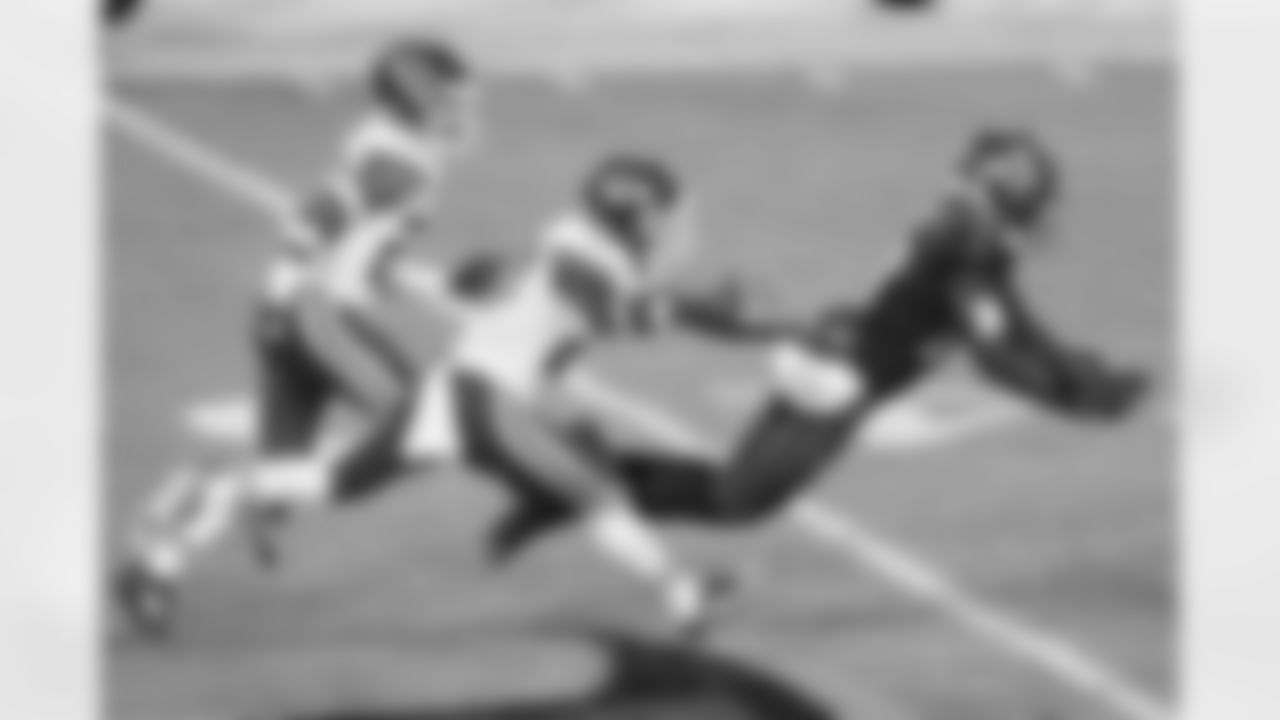
TAMPA, FL - NOVEMBER 29, 2020 - Wide Receiver Chris Godwin #14 of the Tampa Bay Buccaneers during the game between the Kansas City Chiefs and Tampa Bay Buccaneers at Raymond James Stadium. The Buccaneers lost the game, 27-24. Photo By Jason Parkhurst/Tampa Bay Buccaneers

TAMPA, FL - NOVEMBER 29, 2020 - Wide Receiver Scotty Miller #10 of the Tampa Bay Buccaneers before the game between the Kansas City Chiefs and Tampa Bay Buccaneers at Raymond James Stadium. The Buccaneers lost the game, 27-24. Photo By Tori Richman/Tampa Bay Buccaneers

TAMPA, FL - DECEMBER 13, 2020 - Wide Receiver Scotty Miller #10 of the Tampa Bay Buccaneers catches a touchdown during the game between the Minnesota Vikings and Tampa Bay Buccaneers at Raymond James Stadium. The Buccaneers won the game, 26-14. Photo By Matt May/Tampa Bay Buccaneers
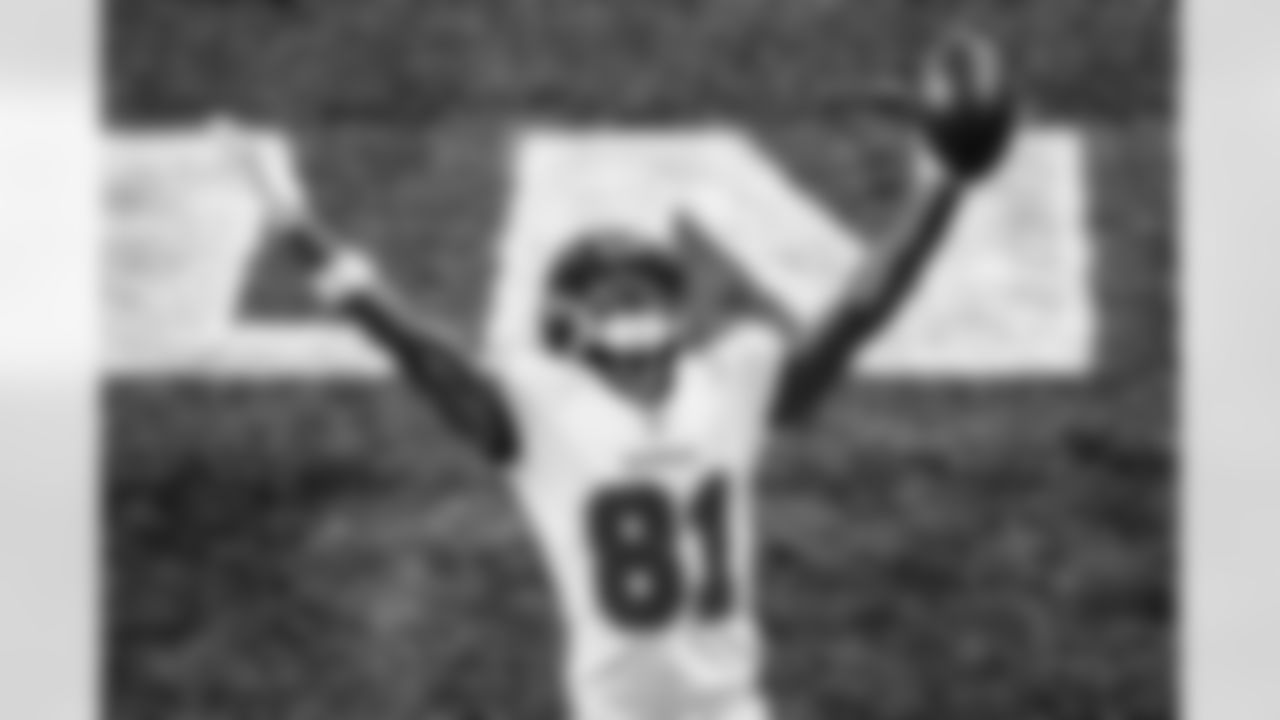
ATLANTA, GA - DECEMBER 20, 2020 - Wide Receiver Antonio Brown #81 of the Tampa Bay Buccaneers during the game between the Tampa Bay Buccaneers and Atlanta Falcons at Mercedes-Benz Stadium. The Buccaneers won the game, 31-27. Photo By Tori Richman/Tampa Bay Buccaneers

DETROIT, MI - DECEMBER 26, 2020 - Wide Receiver Tyler Johnson #18 of the Tampa Bay Buccaneers during the game between the Tampa Bay Buccaneers and Detroit Lions at Ford Field. The Buccaneers won the game, 47-7. Photo By Kyle Zedaker/Tampa Bay Buccaneers

DETROIT, MI - DECEMBER 26, 2020 - Wide Receiver Mike Evans #13 of the Tampa Bay Buccaneers catches a touchdown during the game between the Tampa Bay Buccaneers and Detroit Lions at Ford Field. The Buccaneers won the game, 47-7. Photo By Kyle Zedaker/Tampa Bay Buccaneers
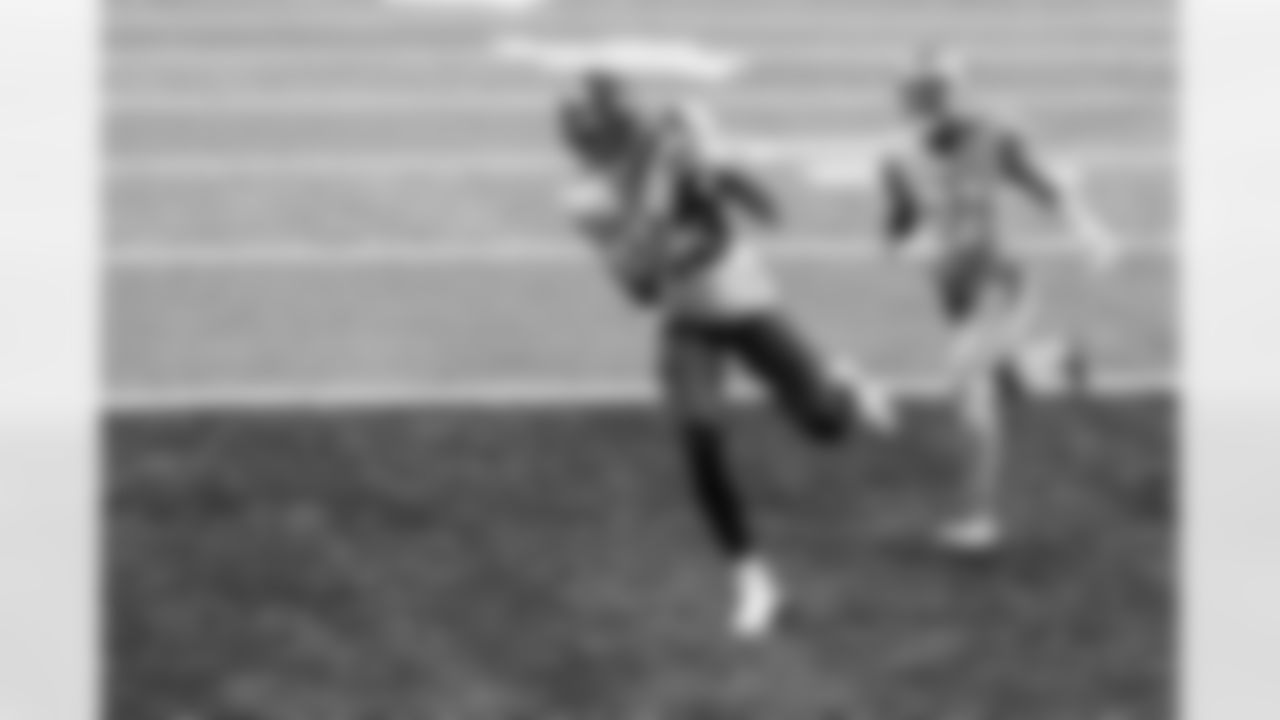
DETROIT, MI - DECEMBER 26, 2020 - Wide Receiver Mike Evans #13 of the Tampa Bay Buccaneers during the game between the Tampa Bay Buccaneers and Detroit Lions at Ford Field. The Buccaneers won the game, 47-7. Photo By Tori Richman/Tampa Bay Buccaneers

DETROIT, MI - DECEMBER 26, 2020 - Wide Receiver Chris Godwin #14 of the Tampa Bay Buccaneers during the game between the Tampa Bay Buccaneers and Detroit Lions at Ford Field. The Buccaneers won the game, 47-7. Photo By Tori Richman/Tampa Bay Buccaneers
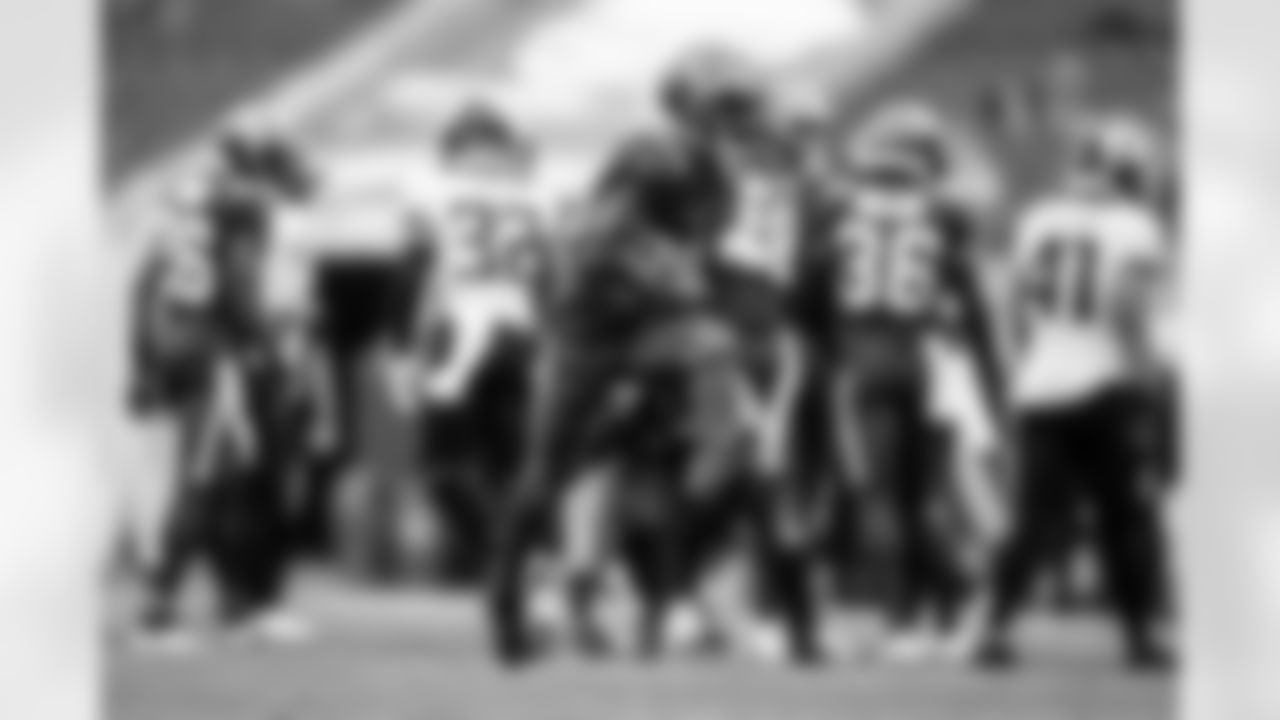
TAMPA, FL - JANUARY 03, 2021 - Wide Receiver Jaydon Mickens #85 of the Tampa Bay Buccaneers during the game between the Atlanta Falcons and Tampa Bay Buccaneers at Raymond James Stadium. The Buccaneers won the game, 44-27. Photo By Kyle Zedaker/Tampa Bay Buccaneers

TAMPA, FL - JANUARY 03, 2021 - Wide Receiver Mike Evans #13 of the Tampa Bay Buccaneers becomes the first receiver in NFL history with 1,000 yards in each of his first 7 seasons during the game between the Atlanta Falcons and Tampa Bay Buccaneers at Raymond James Stadium. The Buccaneers won the game, 44-27. Photo By Kyle Zedaker/Tampa Bay Buccaneers

TAMPA, FL - JANUARY 03, 2021 - Wide Receiver Antonio Brown #81 of the Tampa Bay Buccaneers during the game between the Atlanta Falcons and Tampa Bay Buccaneers at Raymond James Stadium. The Buccaneers won the game, 44-27. Photo By Kyle Zedaker/Tampa Bay Buccaneers

TAMPA, FL - JANUARY 03, 2021 - Wide Receiver Chris Godwin #14 of the Tampa Bay Buccaneers during the game between the Atlanta Falcons and Tampa Bay Buccaneers at Raymond James Stadium. The Buccaneers won the game, 44-27. Photo By Kyle Zedaker/Tampa Bay Buccaneers

TAMPA, FL - JANUARY 03, 2021 - Wide Receiver Chris Godwin #14 of the Tampa Bay Buccaneers celebrates a touchdown during the game between the Atlanta Falcons and Tampa Bay Buccaneers at Raymond James Stadium. The Buccaneers won the game, 44-27. Photo By Kyle Zedaker/Tampa Bay Buccaneers

TAMPA, FL - JANUARY 03, 2021 - Wide Receiver Antonio Brown #81 of the Tampa Bay Buccaneers scores a touchdown during the game between the Atlanta Falcons and Tampa Bay Buccaneers at Raymond James Stadium. The Buccaneers won the game, 44-27. Photo By Mike Carlson/Tampa Bay Buccaneers
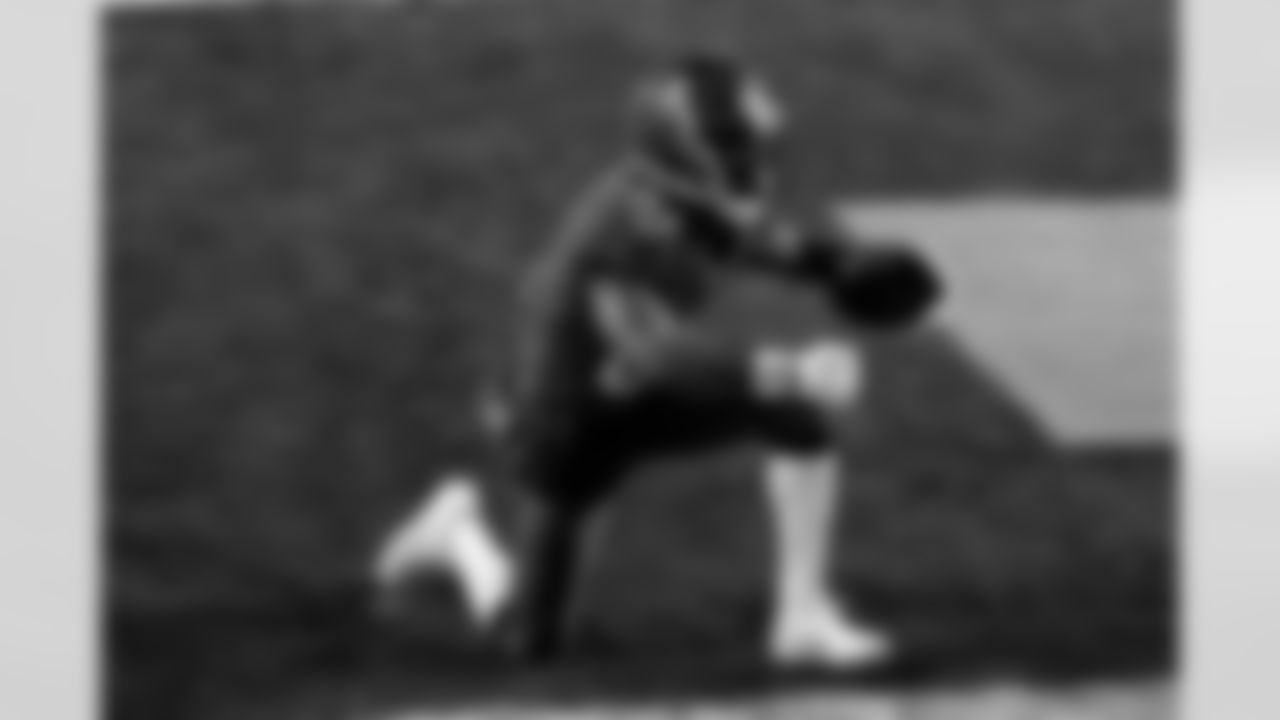
LANDOVER, MD - JANUARY 09, 2021 - Wide Receiver Antonio Brown #81 of the Tampa Bay Buccaneers celebrates a touchdown during the NFC Wild Card playoff game between the Tampa Bay Buccaneers and Washington Football Team at Fedex Field. The Buccaneers won the game, 31-23. Photo By Matt May/Tampa Bay Buccaneers
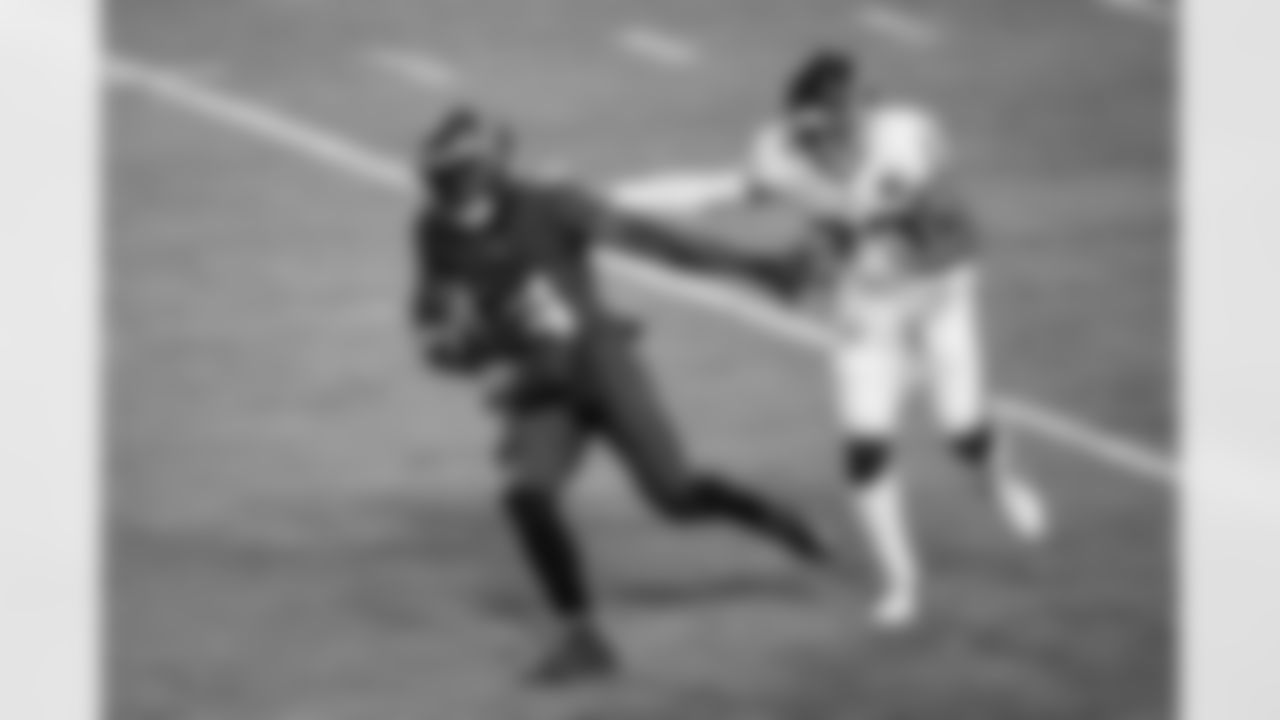
LANDOVER, MD - JANUARY 09, 2021 - Wide Receiver Chris Godwin #14 of the Tampa Bay Buccaneers catches a touchdown during the NFC Wild Card playoff game between the Tampa Bay Buccaneers and Washington Football Team at Fedex Field. The Buccaneers won the game, 31-23. Photo By Matt May/Tampa Bay Buccaneers
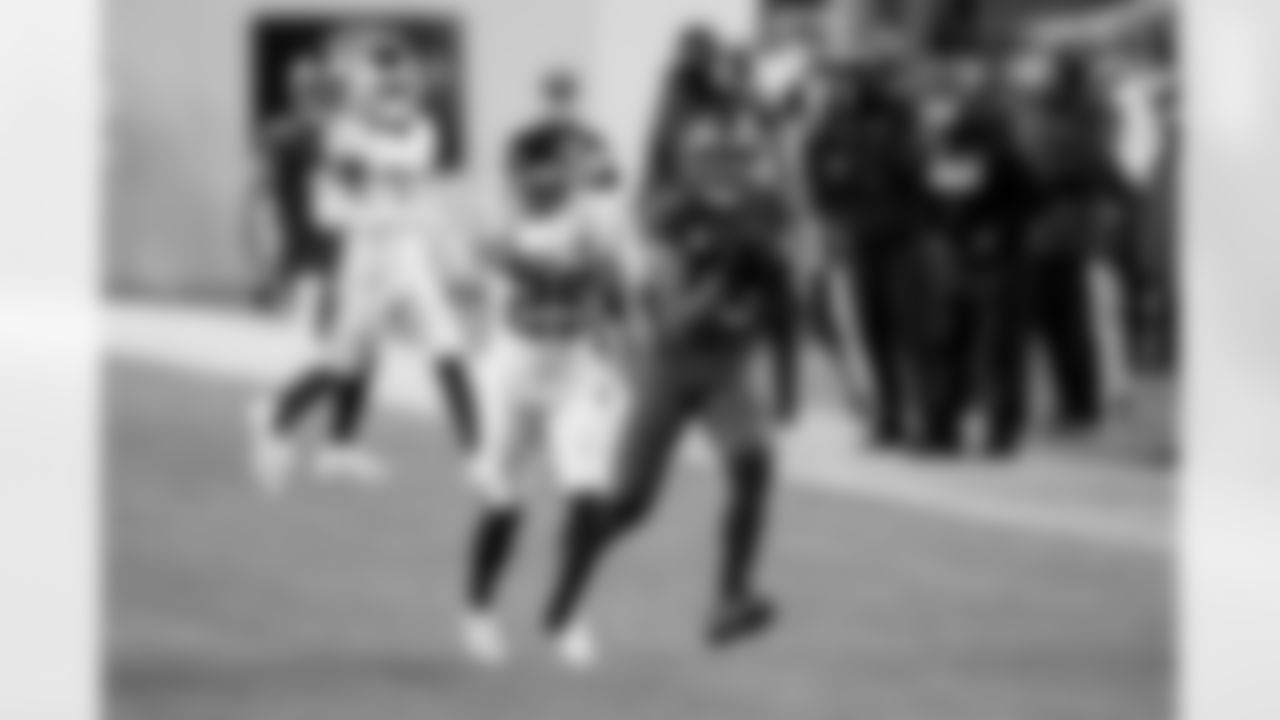
LANDOVER, MD - JANUARY 09, 2021 - Wide Receiver Mike Evans #13 of the Tampa Bay Buccaneers during the NFC Wild Card playoff game between the Tampa Bay Buccaneers and Washington Football Team at Fedex Field. The Buccaneers won the game, 31-23. Photo By Matt May/Tampa Bay Buccaneers
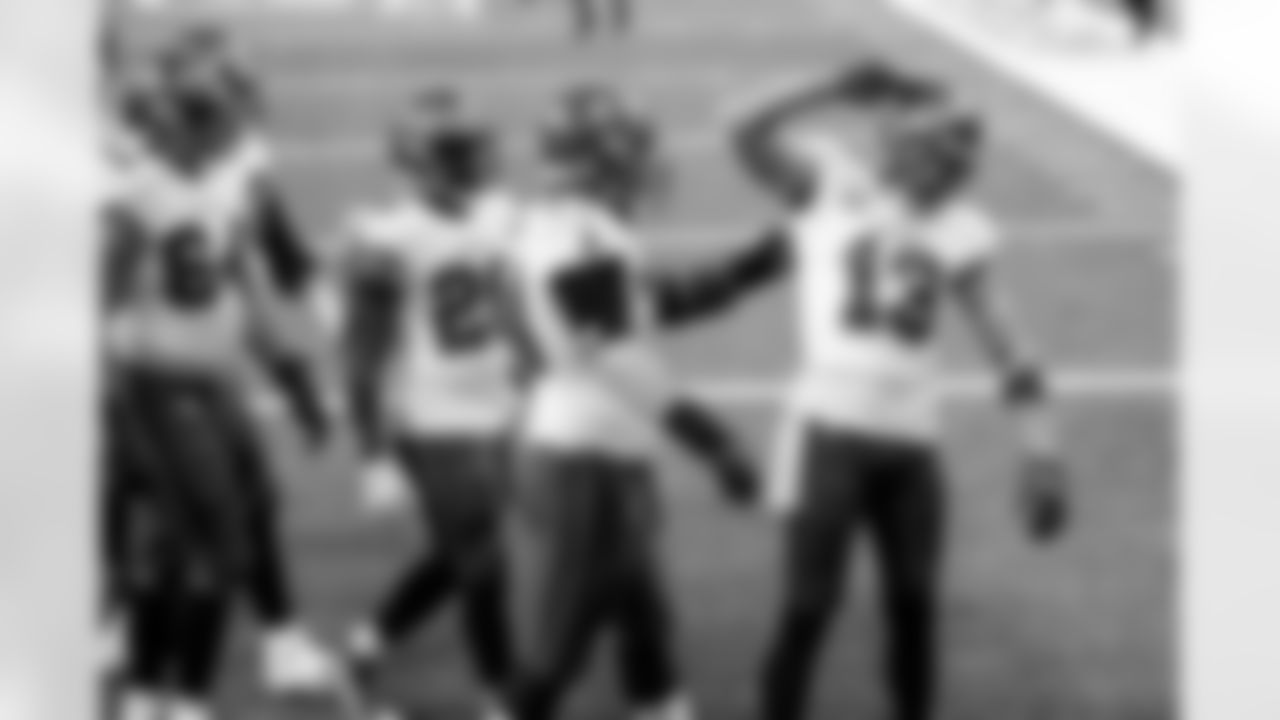
NEW ORLEANS, LA - JANUARY 17, 2021 - Wide Receiver Mike Evans #13 of the Tampa Bay Buccaneers celebrates a touchdown during the NFC Divisional Round game between the Tampa Bay Buccaneers and New Orleans Saints at Mercedes-Benz Superdome. The Buccaneers won the game, 30-20. Photo By Matt May/Tampa Bay Buccaneers
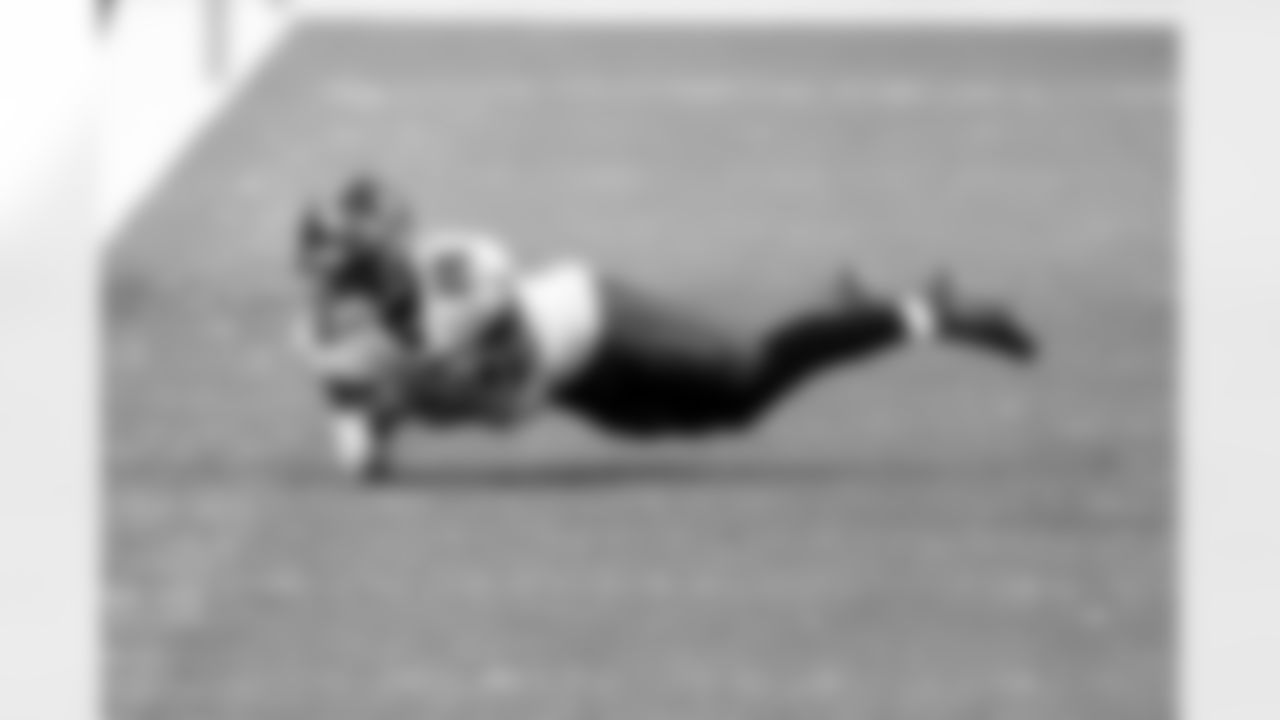
NEW ORLEANS, LA - JANUARY 17, 2021 - Wide Receiver Tyler Johnson #18 of the Tampa Bay Buccaneers during the NFC Divisional Round game between the Tampa Bay Buccaneers and New Orleans Saints at Mercedes-Benz Superdome. The Buccaneers won the game, 30-20. Photo By Matt May/Tampa Bay Buccaneers

GREEN BAY, WI - JANUARY 24, 2021 - Wide Receiver Justin Watson #17 and Wide Receiver Jaydon Mickens #85 of the Tampa Bay Buccaneers before the NFC Championship game between the Tampa Bay Buccaneers and Green Bay Packers at Lambeau Field. The Buccaneers won the game 31-26. Photo By Kyle Zedaker/Tampa Bay Buccaneers

GREEN BAY, WI - JANUARY 24, 2021 - Wide Receiver Scotty Miller #10 of the Tampa Bay Buccaneers before the NFC Championship game between the Tampa Bay Buccaneers and Green Bay Packers at Lambeau Field. The Buccaneers won the game 31-26. Photo By Kyle Zedaker/Tampa Bay Buccaneers
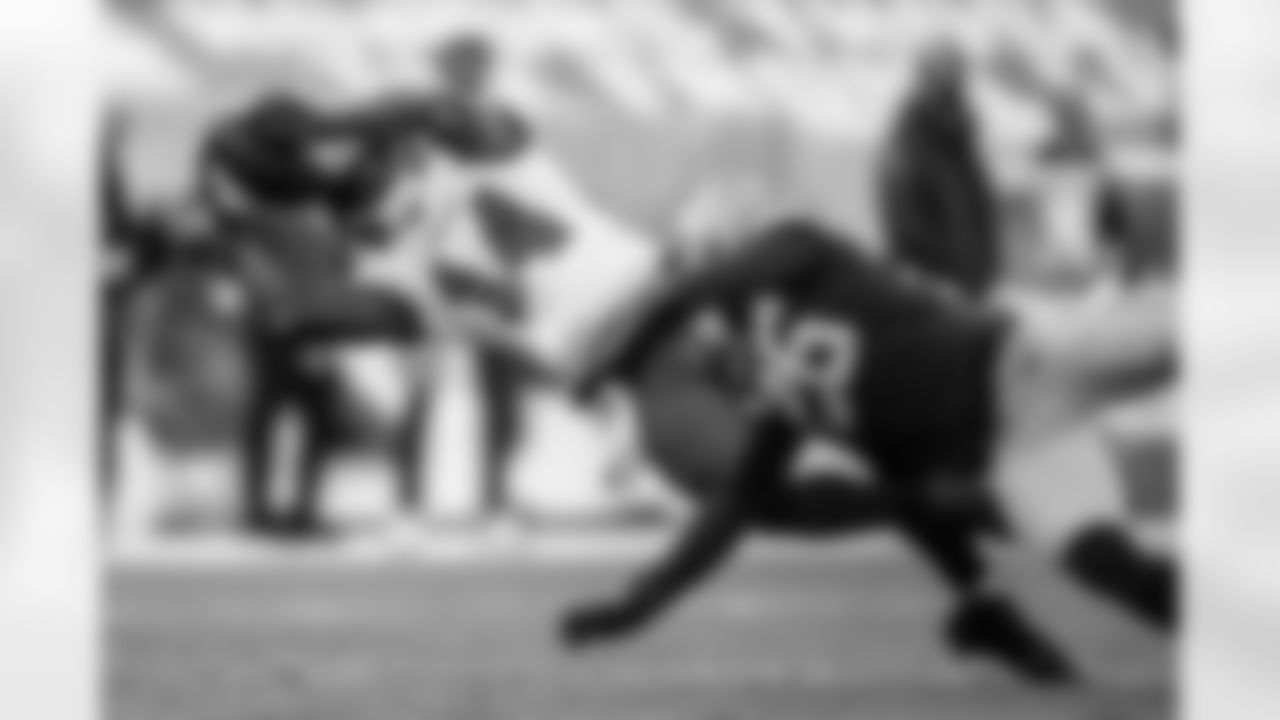
GREEN BAY, WI - JANUARY 24, 2021 - Wide Receiver Chris Godwin #14 of the Tampa Bay Buccaneers during the NFC Championship game between the Tampa Bay Buccaneers and Green Bay Packers at Lambeau Field. The Buccaneers won the game 31-26. Photo By Kyle Zedaker/Tampa Bay Buccaneers

GREEN BAY, WI - JANUARY 24, 2021 - Wide Receiver Scotty Miller #10 of the Tampa Bay Buccaneers catches a touchdown during the NFC Championship game between the Tampa Bay Buccaneers and Green Bay Packers at Lambeau Field. The Buccaneers won the game 31-26. Photo By Kyle Zedaker/Tampa Bay Buccaneers

GREEN BAY, WI - JANUARY 24, 2021 - Wide Receiver Scotty Miller #10 and Offensive Assistant Antwaan Randle El of the Tampa Bay Buccaneers during the NFC Championship game between the Tampa Bay Buccaneers and Green Bay Packers at Lambeau Field. The Buccaneers won the game 31-26. Photo By Kyle Zedaker/Tampa Bay Buccaneers

GREEN BAY, WI - JANUARY 24, 2021 - Wide Receiver Scotty Miller #10 of the Tampa Bay Buccaneers during the NFC Championship game between the Tampa Bay Buccaneers and Green Bay Packers at Lambeau Field. The Buccaneers won the game, 31-26. Photo By Matt May/Tampa Bay Buccaneers
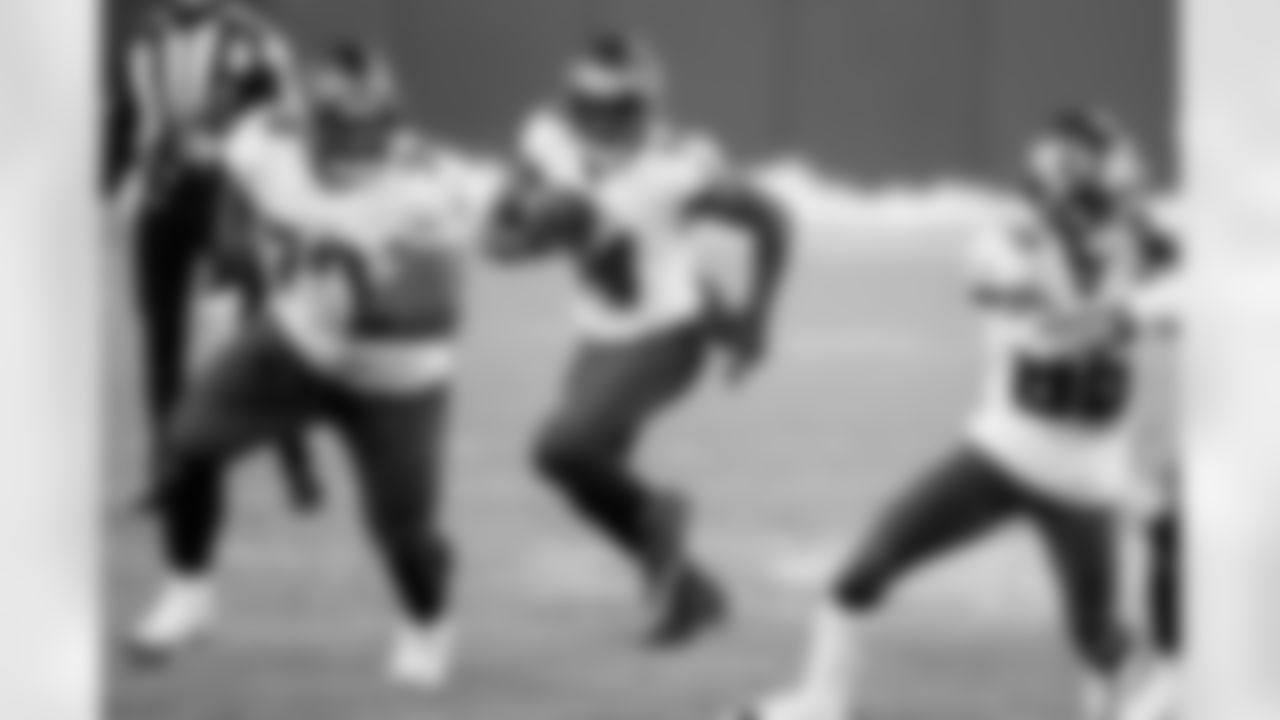
GREEN BAY, WI - JANUARY 24, 2021 - Wide Receiver Chris Godwin #14 of the Tampa Bay Buccaneers during the NFC Championship game between the Tampa Bay Buccaneers and Green Bay Packers at Lambeau Field. The Buccaneers won the game, 31-26. Photo By Matt May/Tampa Bay Buccaneers

GREEN BAY, WI - JANUARY 24, 2021 - Wide Receiver Mike Evans #13 of the Tampa Bay Buccaneers during the NFC Championship game between the Tampa Bay Buccaneers and Green Bay Packers at Lambeau Field. The Buccaneers won the game 31-26. Photo By Tori Richman/Tampa Bay Buccaneers

GREEN BAY, WI - JANUARY 24, 2021 - Wide Receiver Jaydon Mickens #85 of the Tampa Bay Buccaneers after the NFC Championship game between the Tampa Bay Buccaneers and Green Bay Packers at Lambeau Field. The Buccaneers won the game 31-26. Photo By Tori Richman/Tampa Bay Buccaneers

TAMPA, FL - February 07, 2021 - Wide Receiver Mike Evans #13 and Wide Receiver Chris Godwin #14 of the Tampa Bay Buccaneers before Super Bowl LV between the Kansas City Chiefs and Tampa Bay Buccanerers at Raymond James Stadium. The Buccaneers won the game, 31-9. Photo By Kyle Zedaker/Tampa Bay Buccaneers

TAMPA, FL - February 07, 2021 - Wide Receiver Antonio Brown #81 of the Tampa Bay Buccaneers during Super Bowl LV between the Kansas City Chiefs and Tampa Bay Buccanerers at Raymond James Stadium. The Buccaneers won the game, 31-9. Photo By Kyle Zedaker/Tampa Bay Buccaneers

TAMPA, FL - February 07, 2021 - Wide Receiver Mike Evans #13 of the Tampa Bay Buccaneers during Super Bowl LV between the Kansas City Chiefs and Tampa Bay Buccanerers at Raymond James Stadium. The Buccaneers won the game, 31-9. Photo By Kyle Zedaker/Tampa Bay Buccaneers
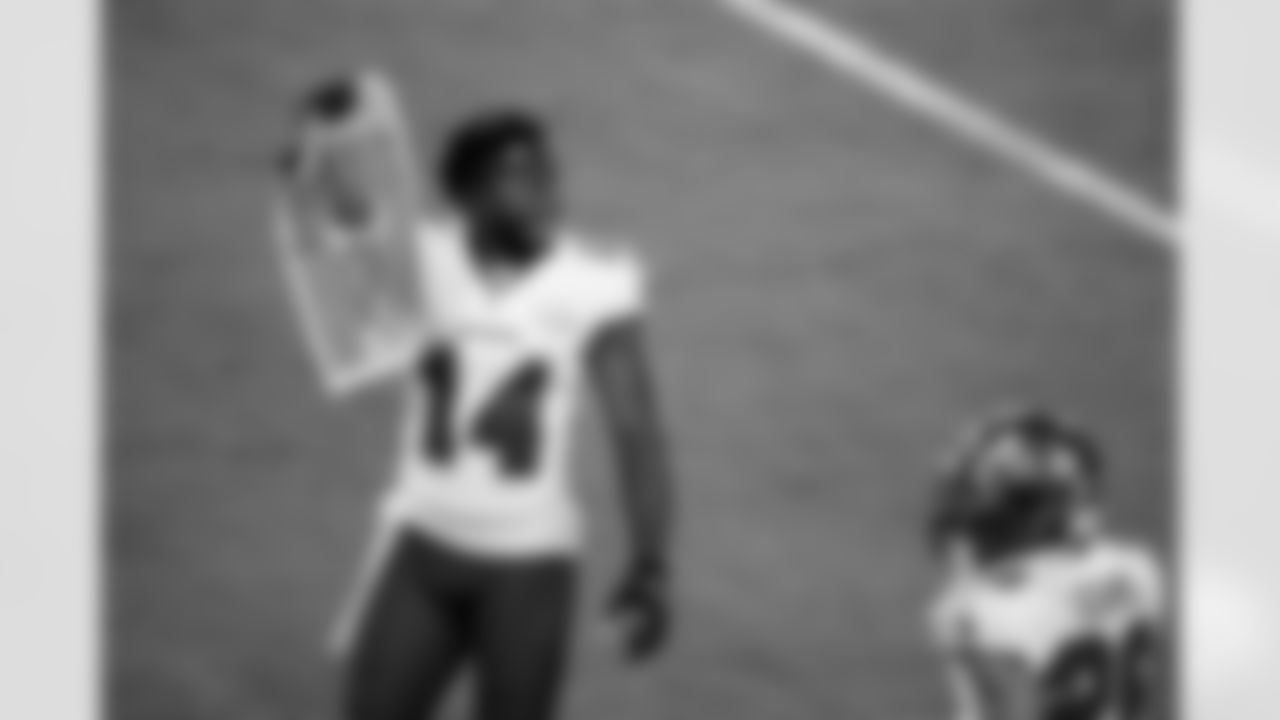
TAMPA, FL - February 07, 2021 - Wide Receiver Chris Godwin #14 of the Tampa Bay Buccaneers celebrates during Super Bowl LV between the Kansas City Chiefs and Tampa Bay Buccanerers at Raymond James Stadium. The Buccaneers won the game, 31-9. Photo By Matt May/Tampa Bay Buccaneers

TAMPA, FL - FEBRUARY 07, 2021 - Wide Receiver Mike Evans #13 of the Tampa Bay Buccaneers before Super Bowl LV between the Kansas City Chiefs and Tampa Bay Buccanerers at Raymond James Stadium. The Buccaneers won the game, 31-9. Photo By Tori Richman/Tampa Bay Buccaneers

TAMPA, FL - FEBRUARY 07, 2021 - Wide Receiver Chris Godwin #14 of the Tampa Bay Buccaneers after Super Bowl LV between the Kansas City Chiefs and Tampa Bay Buccanerers at Raymond James Stadium. The Buccaneers won the game, 31-9. Photo By Tori Richman/Tampa Bay Buccaneers
- 19 resulted in a new long-term contract with the original team before the start of the season
- 22 resulted in the tagged player signing the tag's tender offer and converting it into a one-year contract with the original team
- 4 resulted in the tagged player being traded before the start of the season
- 1 resulted in the player signing with another team and the original team not matched
- 1 was rescinded before the player signed the tag's tender offer
- 1 resulted in the player refusing to sign and sitting out the entire season
Last year's results swung the percentages here, as 11 of the 14 tagged players signed their offers and played on one-year deals, making them potential free agents again this year. My numbers from last year had exactly half of the players getting new long-term deals before the upcoming season, but now that number is below 50 percent.
As it turns out, three of those 11 players who signed their tenders in 2020 have been given the franchise tag again in 2021, as that's what Denver, Washington and the New York Giants have done with safety Justin Simmons, guard Brandon Scherff and defensive end Leonard Williams, respectively. In addition, after playing 2020 on his first franchise tag, Dallas quarterback Dak Prescott signed a lucrative new four-year deal earlier this week.
The two tagged players who ended up with new deals before the 2020 season began were Tennessee running back Derrick Henry and Kansas City defensive tackle Chris Jones. Jacksonville defensive end Yannick Ngakoue initially refused to sign his tender but eventually did so on the last day of August in order to facilitate a trade to the Minnesota Vikings.
The Jones deal is the most encouraging one for fans who want to see Chris Godwin wearing red and pewter for a very long time. Jones helped the Chiefs win Super Bowl LIV and both sides were obviously motivated to keep one of their best players around for more runs at the title. The Chiefs almost succeeded, too, if not for the Buccaneers spoiling things in Super Bowl LV. What's less encouraging is that sub-50% track record of tagged players quickly getting new contracts over the last half-dozen years. We'll keep our fingers crossed.
Now, on to your questions.
A reminder that you can send questions to me anytime you want on Twitter (@ScottSBucs) and they're easier to find if you include the hashtag #SSMailbagBucs. We are also now soliciting questions each week on our Instagram page; look for that story on Wednesdays. As always, if you want to get a longer question into the mailbag and would prefer to email your question, you can do so to tbbsocial@buccaneers.nfl.com.
How soon can we start re-signing our own free agents?
- @preb99 (via Instagram)
How about now? Does now work for you?
Right now, the Buccaneers' 24 pending unrestricted free agents (which technically still includes Chris Godwin since he got the non-exclusive variety of franchise tag) are still under contract with the team. Their contracts are all set to expire when the new league year starts at 4:00 p.m. ET on March 17. On March 15, the agents of pending free agents can begin contacting teams and starting negotiations, but no contracts can actually be signed until the 17th.
Until then, pending free agents can only re-sign with their current teams. Really, teams can re-sign – or extend, or renegotiate or restructure, etc. – their own players any time they want. For instance, Lavonte David was going into the last year of his contract in 2015 when the Buccaneers signed him to a five-year extension through 2020 in August of that year. Ali Marpet got his second contract in October of 2018. Mike Evans signed his current contract extension in March of 2019, a year before he was due to hit free agency.
Now, though, the Bucs are up against the deadline when they will stop being the only team that can talk to the likes of Ndamukong Suh, Shaq Barrett, Leonard Fournette and so on. Realistically, you should expect some deals to get done before free agency starts and some, hopefully, after players have officially hit the open market. Look at least offseason as a guide.
Similar to their approach this year, the Bucs made it clear in the weeks leading up to free agency that they were going to try to retain all three of their key defensive free agents, Barrett, Suh and Jason Pierre-Paul. Barrett got the franchise tag, Pierre-Paul re-signed a couple days before free agency and Suh re-signed about a week after free agency started. While I would love to see all of the Bucs' key free agents back in the fold before next Wednesday, I think you can expect at least some of them to wait and see what kinds of offers might be coming their way.
Do you think we can re-sign Suh or will he be a cap casualty?
- @nathandayspring (via Instagram)
That's not the correct either/or question, in my opinion. The Buccaneers might (hopefully) re-sign Ndamukong Suh, or he may sign elsewhere, but I don't expect the issue to be a "cap casualty."
You most often see that term used when a player is cut because his salary for the upcoming is more than his team can handle in their current cap situation. I suppose you could apply it in a roundabout way with a pending free agent, implying that the player and the team would like to come to a new deal but there simply isn't enough cap space to do it at the figure the player wants. But, again, I don't think that's the situation here.
Allow me to share something that General Manager Jason Licht said when he and Head Coach Bruce Arians held a Zoom call with the media back in February. The topic was the way the Buccaneers have structured most of their contracts for the past decade or so. The team has largely taken a "pay-as-you-go" approach with free agents or re-signed players, which means there is often little or no signing bonus and the annual salaries are similar. Large signing bonuses complicate cap situations because they are paid immediately but their cap hit is spread out evenly over the length of a contract. That can be problematic when a team wants to release a player with years left on his deal because the cap hit for the prorated signing bonus on those remaining years accelerates to the point that the player is released.
However, that can also be helpful in the moment when trying to manage a tight salary cap. The Bucs are coming off one Super Bowl championship and believe they are built to contend for more titles right now, so they could deviate from that approach when necessary to make the cap work right now. This is what Licht said:
"Well the reason a lot of those contracts were set up that way for so long, which some were before I was even here, is so that when you get to a point where you have a very successful team and you want to keep as many of the core players that you can together. We don't want to do anything that's going to mortgage or completely disrupt the future, but we have flexibility now and the ability to try to keep this team together, as Bruce [Arians] and I have both been saying."
Just remember that the salary cap is very malleable. Also, given that it uncharacteristically went down this year due to the financial effects of the pandemic but is expected to go back up significantly in coming years, it makes some sense to do the kind of deals that push some of the cap burden down the road a bit.
All of which is to say I think that if both Suh and the Buccaneers are motivated to get another deal done and they can agree on a reasonable figure, the salary cap won't be an issue. If I were a betting man, I'd say the deal gets done, but it may not happen right away.
Do you think we will get a long term deal done with Godwin or will he end up signing the tag?
- @joshua_alves1 (via Instagram)
If you skipped my intro to this mailbag to get right to the fans' questions, I don't blame you. But for the purposes of this question you may want to scroll back up and read it. To summarize, over the past six years a little less than 50% of the players who got franchise tags ended up signing new long-term deals with their teams before that season began. Last year was not a good one in this regard, if the goal was to get those deals done, because only two of the tagged players came to agreement on new deals in the months between the placement of the tag and the start of the season. A third, Dallas quarterback Dak Prescott, played on the tag but did get a big new deal earlier this week.
For the record, there actually is a deadline for such deals to get done. Teams can continue to negotiate with and sign their players after they've issued the franchise tag, but there is a deadline every year for that to get done, usually right around mid-July. If a player does not have a new deal by then, his only options are to sign the tag and play on the resulting one-year deal or sit out the season. The Buccaneers and Shaq Barrett were not able to come to a deal last year, which is why he is now a pending free agent after playing last year on the tag.
That said, I'm cautiously optimistic about it working out for the long run this time with Godwin. (And hopefully Barrett still gets a new deal in Tampa, too.) Let's look at the two players who did get long-term deals last year after getting tagged.
One was Tennessee running back Derrick Henry, who at the time was 26 years old and was a player who was clearly on an upward career trajectory. Look at his rushing totals in his five seasons so far, in chronological order: 490, 744, 1,059, 1,540, 2,027. Henry was also quite obviously a crucial part of the Titans' offense and Tennessee had made it to the conference championship game in 2019 and expected to continue to compete for a title. I would argue that Godwin has a similar profile, even though his statistics took a mild dip in 2020 due to injuries and the Bucs' abundance of weapons. Godwin just turned 25 and is clearly still on the rise, and as Bruce Arians has said he plays multiple important roles in the Bucs' offense.
Then you have Kansas City's Chris Jones, the disruptive interior defensive lineman who, like Godwin, was named to his first Pro Bowl after the 2019 season. Also like Godwin, who is an extraordinary blocker and who can dominate both outside and in the slot, Jones gives the Chiefs something that is hard to replace, mainly serious pressure up the middle. And Kansas City was coming off a Super Bowl win last year and had what it believed was a core that could win several more. They wanted to keep the gang together and Jones wanted to be a part of it. When he signed his new deal he made it clear how much he had wanted to be with the Chiefs "for the long haul."
Chris Godwin will and should get paid, beyond just the $15-16 million he would get this year playing on the tag. That could be in the form of a new deal this spring or summer or a big contract in Tampa or elsewhere next year. But I believe that all things being equal, based on some of his comments since the Super Bowl, he would like to stay with the Bucs and chase more championships here. There's no guarantee that will happen, but like I said I'm cautiously optimistic.
Hey Scott!
Love the new deals for Godwin and Lavonte but I still wonder if we can keep all of those free agents together. I'm hopeful but I guess it's possible that some of them will move on…..at least we got one Superbowl win out of it all first! So if the Bucs are possibly going to lose some guy's from last year's team but are still going to contend, who are some of the players who haven't had big roles yet who could step up? Is there depth to make up for some of those losses. Thanks if you get to my question, and I still can't believe we won the Superbowl. All hail TB12!
- Leonard, long-time Bucs fan in Plant City (via email)
/deep breath (Super Bowl is two words! Super Bowl is two words! Super Bowl is two words!)
Okay, I'm better now. First, I should note that I have mostly avoided discussing the potential new contract for Lavonte David because the Buccaneers have to this point made no such announcement. Obviously, though, Leonard has seen outside reports to that effect. And that would be a very, very good thing if it comes to pass!
It's a good question, too, and there are some obvious answers from recent drafts. For instance, if Leonard Fournette does not re-sign with the Buccaneers that would seem to clear a path to more playing time for 2020 third-round pick Ke'Shawn Vaughn. Vaughn really only got sporadic playing time in his rookie season but he did show some promise. If Fournette is not on the team and the Bucs don't use a high pick on a running back in April, it seems likely that Vaughn would step in as the complement to Ronald Jones, who I expect would remain the starter.
Keeping Chris Godwin on the franchise tag means the Buccaneers don't need to find another starter from their current crop of wideouts, but they may still have a lot of snaps available if Antonio Brown does not return. Brown became the Bucs' primary third receiver after signing at midseason, playing mostly in three-receiver sets on the outside with Godwin moving into the slot. Scotty Miller already stepped up to a good extent last year in his second season but could get an even bigger chance to show that he can consistently make big plays downfield. Tyler Johnson, taken in the fifth round last year, made a handful of big plays and could help in the slot if the Bucs want to go three-wide with Godwin on the outside.
On defense, the Bucs might need a lot more out of Anthony Nelson if they are unable to re-sign Shaq Barrett. Asking any player – currently on the roster, free agent or draftee – to replace Barrett's production (27.5 sacks over the past two seasons) would be a tall order, but Nelson could be a bigger part of the Bucs' pressure package in his third year after playing about a third of the defensive snaps in 2020. And the Bucs might have something in Cam Gill, the 2020 undrafted free agent who combined with Ndamukong Suh for a sack in the Super Bowl.
Speaking of Suh, if he moves on in 2021 the Bucs might see what they have in 2020 sixth-round pick Khalil Davis. Again, I'm not suggesting that Davis would completely take over the role left by a departed Suh, but he could be part of the answer, particularly in terms of rushing the passer. The Buccaneers think that is the strength of Davis's game, but we didn't get to see much of it in 2020.
Of course, the true answer to this question could come in late April when the draft is conducted. The Buccaneers didn't know last March that Tristan Wirfs and Antoine Winfield, Jr. would end up playing such important roles in their Super Bowl run, but they did know they wanted to add potential starters at right tackle and safety. Maybe they'll hit the jackpot again in the early rounds of the 2021 draft and those players will end up replacing what the team (hypothetically but hopefully not) loses in free agency.





































